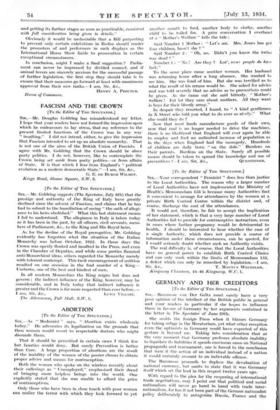[To the Editor of TILE SPECTATOR.] SIR,-4 hope that you
will permit me a few lines to reply briefly to Mr. MacMichael's lengthy exposition of his reasons for objecting to certain prospective and existing legislation designed to protect animals.
Those who have the interests of animals at heart should never forget that " extremist legislation cannot and should not be approved by Parliament, and in the case of Private Member's Measures in particular, successful passage inevitably depends on ability to satisfy all reasonable opposition.
In the case of the Protection of Animals Act, 1934, the Under-Secretary of State for Home Affairs during the Second Reading Debate said, " I must, however, warn the House that, should it receive a Second Reading, its drafting will have to be very carefully considered. For instance, it provides in its present form that no person is to ride or attempt to ride any untameable or uncontrollable animal. If a horse at a circus took fright and became uncontrollable . . . I am not sure what the consequences under the Bill might be . . . That is the type of thing we have to put right in Committee. The Government then have no objection to the Bill going before a Committee of the whole House
and getting its further stages as soon as practicable, consistent with full consideration being given to details."
Obviously it would be undesirable that a Bill purporting to prevent only certain exhibitions in Rodeo should render the promoters of and performers in such displays as the International Horse Show liable to prosecution in certain exceptional circumstances.
In conclusion, might I make a final suggestion ? Parlia- ment can never be impressed by divided counsel, and if animal lovers are sincerely anxious for the successful passage of further legislation, the first step they should take is to ensure that their measures go forward at least with unanimous approval from their own ranks.—I am, Sir,. &c., House of Commons. HENRY A. PROCTER.







































 Previous page
Previous page